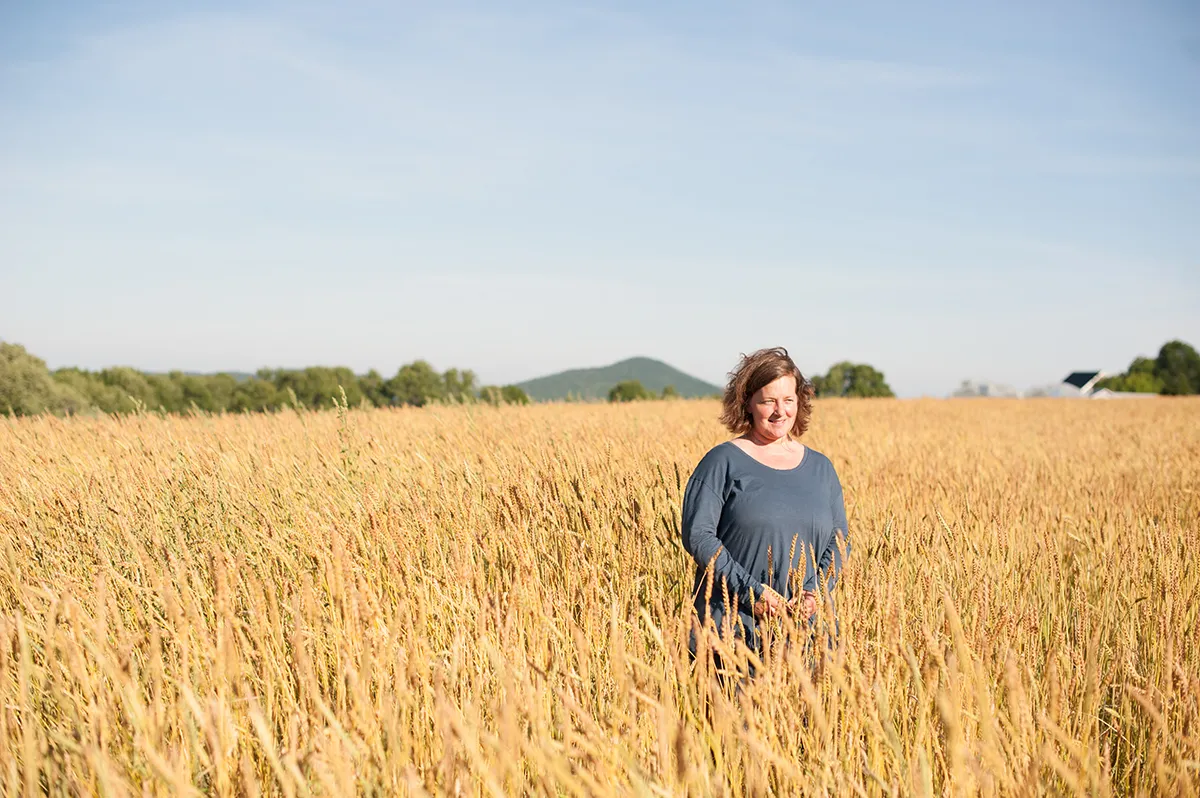When Maine farmers faced a two-fold problem, Amber Lambke ’96 found solutions inside a four-story county jailhouse.
A decade ago, Maine’s organic dairy farmers lacked the organic feed and straw necessary to sustain their dairy farms. The state also lacked the necessary infrastructure and machinery to make food-grade grains available for consumers.
Enter Lambke, a Brunswick, Maine, native and a speech-language pathologist who had been part of a private practice in the coastal town of Portland for a decade. Marriage and a move took Lambke north to Skowhegan, a town with a population of about 8,500. “I was still a practicing speech-language pathologist, but at some point, Maine Grains became an all-encompassing project,” she said.
Lambke and Michael Scholz, a local baker, were able to secure Skowhegan’s 14,000-square-foot former jailhouse for $65,000. The repurposed Somerset County Jail Building became home to Maine Grains, a gristmill and retail outlet that gives grain growers a spot to process the fruits of their labor.
On the positive side, the downtown location of Maine Grains provided easy access for trucks to make deliveries or exit, and the facility also contained a functional commercial kitchen. The thickness of the walls created a ready-made sound barrier to prevent noisy equipment from bothering residents and visitors. But then — there were some challenges: Converting the jailhouse into a grain processing facility was pricey. Concrete floors and ceilings had to be cut so that pieces of equipment could be hoisted up multiple floors. Processes also had to be put in place to facilitate the flow of grain. In 2012, Maine Grains opened for business.
Lambke’s preparation at IC for her later career came from both the speech-language pathology program and women’s crew. “You have to work hard toward a common goal, and it takes a fair amount of grit to stick with crew,” Lambke said. “There was so much to rowing — where to place your energy and not place your energy. All of this does not happen without learning about team functioning and team building.”
Lambke started learning about the needs of Maine farmers when she volunteered at a farmer’s market. As she delved further into farming, Lambke learned about grains and soil particular to New England. She found that oats and rye are two solid crop options for choking out weeds and maintaining healthy soil. Oats also tend to grow well in the cooler New England climate. As farmers have seen their sales capabilities improve during the last decade, the state’s craft brewery industry has also grown. According to the Maine Brewers Guild, there were 73 active craft breweries in Maine in 2015. As of spring 2018, Maine had 117 active licensed breweries.
Amid the progress, Lambke sees more room for growth and the continued revitalization of downtown Skowhegan. “Not all [Maine] counties have the infrastructure,” Lambke said. “Fifty percent of our business comes from outside the state of Maine.”
In 2018 Maine Grains worked with 36 organic farmers and processed 1,200 tons of grain. The regional growth of the business has been steady, albeit on a smaller scale than mills that serve a nationwide clientele. “Our annual throughput amounts to what an industrial mega mill can do in two days,” Lambke said. “Our sales have resulted in grain purchases that amount to over $1 million spent with organic farmers since our startup. Sales in 2018 will have grown by 45 percent.”
Lambke has been getting the word out for more than a decade. “I set speech-language pathology aside, but being a good listener and observer is still important,” Lambke said. “I am just solving different kinds of problems.”
